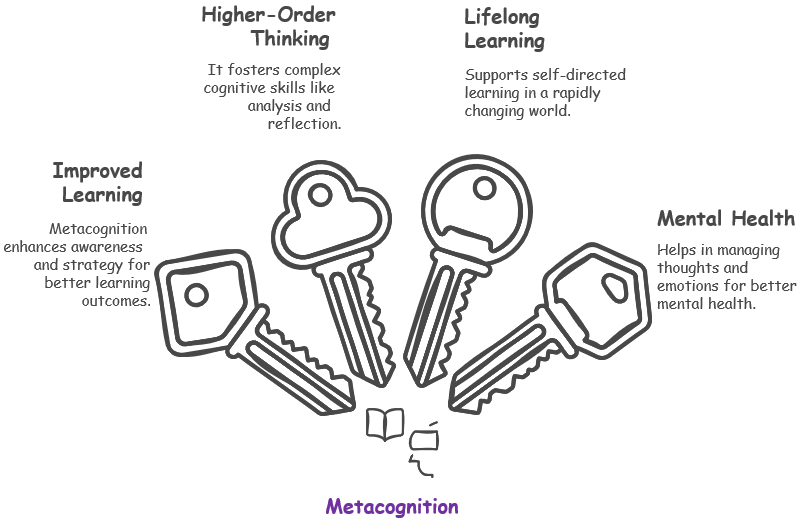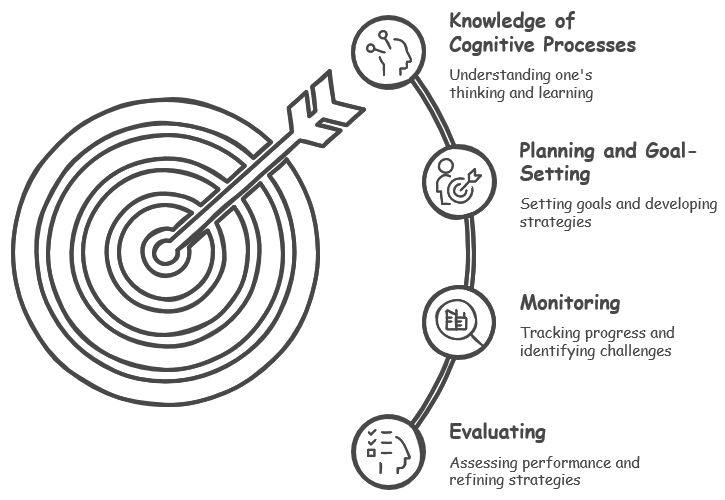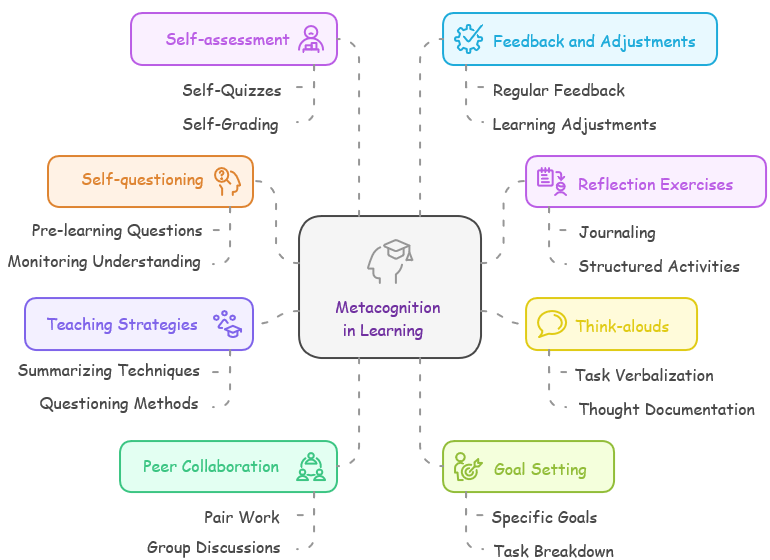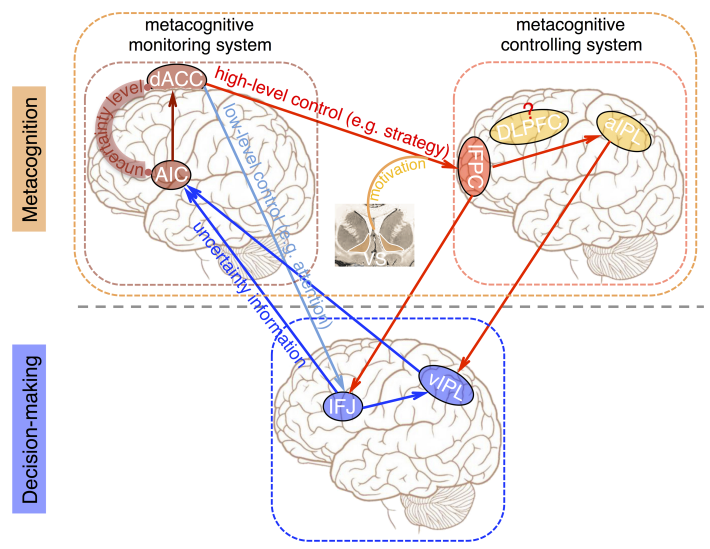|
Metacognition
Metacognition means 'cognition about cognition'. Putting it in simpler form, 'thinking about my own thinking
(i.e, my own congnition)'. It involves being aware of one's own thought processes
The prefix "meta-" comes from Greek and has multiple meanings, but in general it refers to something that is beyond, transcending. You would have heard of this
prefix pretty often from the word 'metaphysics' which is a branch of philosophy deals with 'something beyond physical object', in other words the study of the fundamental nature of reality and existence rather than what appears in physical form.
Cognition refers to the mental processes and activities related to acquiring, processing, storing, and using information. It encompasses a wide range of mental activities,
including perception, attention, memory, language, problem-solving, reasoning, and decision-making.
One of the reasons why the term 'Metacoginition' is getting attention from many people is because it is an important aspect of learning and problem-solving, as it allows individuals to take a more active role in their own learning and to adapt
their strategies based on their own experiences and feedback. It is also an important aspect of self-regulated learning, which refers to the ability to manage one's own learning and motivation. We can describe some of the reasons more specifically as below :

- Improved Learning: Metacognition has been shown to improve learning outcomes, as it helps individuals become aware of their own cognitive processes, identify areas where they may need to improve, and develop strategies to address those areas.
- Higher-Order Thinking: Metacognition is considered a higher-order thinking skill, which means it is a skill that goes beyond basic knowledge acquisition and involves more complex cognitive processes such as analysis, evaluation, and reflection. These skills are increasingly important in many professional
fields and are highly valued by employers.
- Lifelong Learning: In today's rapidly changing world, there is an increasing need for individuals to become lifelong learners who can adapt to new challenges and circumstances. Metacognition can help individuals become more self-directed learners who are better equipped to manage their own learning
and acquire new skills and knowledge.
- Mental Health: Metacognition has also been linked to improved mental health outcomes, as it can help individuals become more aware of their own thoughts and emotions and develop strategies for managing them.
There are several components of metacognition in the context of learning and problem-solving. Followings are some of those components.

- Knowledge of one's own cognitive processes: This involves understanding how one thinks, reasons, and learns, as well as being aware of one's own strengths and weaknesses in these areas.
- Planning and goal-setting: This involves setting specific goals for learning or problem-solving tasks and developing a plan for how to achieve those goals.
- Monitoring: This involves keeping track of my own progress towards the goal and being aware of any difficulties or challenges that arise.
- Evaluating: This involves assessing my own performance and determining what strategies were effective and what could be improved upon for future learning or problem-solving.
You can apply this theory/method in various ways to improve understanding, problem-solving, and overall academic performance.
By incorporating these metacognitive strategies and activities into teaching and learning, you can develop a deeper understanding of your own cognitive processes and become more effective, self-regulated learners.
Here are some specific examples of metacognition as a learning method

Self-questioning: You can develop your own metacognitive skills by asking yourselves questions before, during, and after learning. For instance, you might consider:
- What do I already know about this topic?
- What are my learning goals?
- How can I monitor my understanding during the process?
- What strategies can I use if I'm struggling?
- How can I evaluate my progress and identify areas for improvement?
Reflection exercises: Try to regularly reflect on your learning experiences by keeping a journal or engaging in structured reflection activities. You can write about successes, challenges, strategies used, and areas for improvement.
Think-alouds: You can practice metacognition by verbalizing your thoughts while completing a task or solving a problem. This helps yourself become aware of their thought processes and identify potential pitfalls or roadblocks. I think one of the best way is to try to write down your
thought in your own words or even better if you have somebody you can talk to and explain your though process.
Teaching and learning strategies: If you are a teacher or Instructors, you can explicitly teach various learning strategies (such as summarizing, questioning, predicting, and visualizing) and encourage students to consider which strategies work best for them in different situations. This can help
students develop a toolkit of metacognitive strategies to draw upon as needed.
Peer collaboration: Encourage students to work in pairs or small groups to discuss and compare their approaches to a task, share their thought processes, and provide feedback to one another. This can help them develop metacognitive awareness and learn from their peers' strategies.
Goal setting and planning: Try to set specific, achievable learning goals and develop plans to reach those goals. This includes breaking tasks into smaller, manageable steps and regularly evaluating progress. It may not always be easy to set a goal unless you had a lot of pratice. I think a good start
would be 'write down what you want to learn in the form of question' and set the goal like this 'Finding the answer to this question is the goal for this week' and then extend the questions further and set goals for longer period.
Self-assessment and self-monitoring: Encourage students to assess their own learning and performance through self-quizzes, self-grading, or other self-assessment tools. This can help them monitor their understanding, identify areas for improvement, and adjust their learning strategies accordingly.
If you are the type of person who is allergic to any kind of quizz or testing (like me :), just try to write down what you have learned in question and answer form.
Feedback and adjustments: Provide students with regular feedback on their performance, and help them identify how they can apply metacognitive strategies to improve. Encourage them to make adjustments to their learning process based on this feedback.
Metacognition is a complex process that likely involves multiple brain regions. These brain regionslikely work together as part of a broader network that supports metacognitive processes. The specific contributions of each region to metacognition may depend on the particular task, cognitive domain, or aspect of metacognition being considered. Further research is needed to better understand
the complex interactions between these regions and their role in supporting metacognitive functions.

AIC : anterior insular cortex;
aIPL : anterior inferior parietal lobule
dACC : dorsal anterior cingulate cortex
DLPFC : dorsolateral prefrontal cortex
IFJ : inferior frontal junction
lFPC : lateral frontopolar cortex
vIPL : ventral inferior parietal lobule.
Image Source : The neural system of metacognition accompanying decision-making in the prefrontal cortex
Dorsolateral prefrontal cortex (DLPFC): The DLPFC is associated with higher-order cognitive processes such as working memory, planning, abstract reasoning, and cognitive flexibility. It plays a crucial role in metacognition by helping individuals monitor and update their cognitive strategies, evaluate their progress, and adjust their approach as needed.
Ventromedial prefrontal cortex (VMPFC): The VMPFC is involved in the processing of emotional and social information, as well as self-referential thinking. It has been suggested that this region contributes to metacognition by allowing individuals to evaluate their own thoughts, beliefs, and emotions and to recognize how these internal states might influence their decision-making and behavior.
Anterior cingulate cortex (ACC): The ACC is involved in various cognitive and emotional processes, including error detection, conflict monitoring, and emotional regulation. Its role in metacognition is thought to be related to its ability to monitor ongoing cognitive processes, detect discrepancies between intended and actual outcomes, and adjust cognitive strategies accordingly.
Insular cortex (insula): The insula is associated with interoceptive awareness, which is the ability to perceive and monitor one's internal bodily states. It is also involved in the processing of emotional information and has been linked to self-awareness. In the context of metacognition, the insula
may help individuals become more aware of their cognitive processes and how they relate to their emotional states.
Inferior Parietal Lobule (IPL): The IPL is a region in the parietal cortex, which is involved in various cognitive functions such as attention, working memory, and spatial awareness. The IPL has been linked to metacognition due to its role in the awareness and evaluation of one's own cognitive processes. Specifically, it is thought to contribute to the monitoring and evaluation of ongoing cognitive processes, as well as the integration of information from different cognitive domains.
Inferior Frontal Junction (IFJ): The IFJ is a region located near the intersection of the inferior frontal and precentral sulcus, which has been associated with cognitive control, attention, and working memory. In the context of metacognition, the IFJ is thought to be involved in the allocation of
attention to internal cognitive processes and the monitoring of task performance. Its role in metacognition may be related to its ability to coordinate and integrate information from different brain regions, allowing for the evaluation and regulation of cognitive processes.
Frontopolar Cortex (FPC): The FPC, also known as the anterior prefrontal cortex or Brodmann area 10, is located in the most anterior part of the frontal lobes. It is associated with higher-order cognitive processes such as planning, decision-making, and the integration of information across different
cognitive domains. The FPC has been implicated in metacognition due to its role in the evaluation and regulation of cognitive processes, as well as the integration of information from other brain regions involved in metacognition.
It is thought to be crucial for monitoring and adjusting cognitive strategies based on feedback and environmental demands.
The interplay between the various brain regions involved in metacognition is complex and not yet fully understood. These regions is considered to work together as part of a broader network to support metacognitive processes, with each region contributing to specific aspects of metacognition. The interactions between these regions can be dynamic, depending on the specific task, cognitive
domain, or aspect of metacognition being considered.
A brief high level view of the interplay is as follows :
Monitoring and evaluation: The dorsolateral prefrontal cortex (DLPFC), inferior parietal lobule (IPL), and anterior cingulate cortex (ACC) play a crucial role in monitoring ongoing cognitive processes, detecting errors, and evaluating performance. The DLPFC and IPL are involved in attending to and
evaluating one's cognitive processes, while the ACC is responsible for detecting discrepancies between intended and actual outcomes.
Cognitive control and regulation: The DLPFC, inferior frontal junction (IFJ), and frontopolar cortex (FPC) are involved in the regulation and adjustment of cognitive strategies based on feedback and environmental demands. The DLPFC is responsible for cognitive flexibility and the ability to update
cognitive strategies, while the IFJ coordinates and integrates information from different brain regions to allocate attention to internal cognitive processes and monitor task performance. The FPC contributes to the planning and decision-making processes by integrating information from other brain regions involved in metacognition.
Self-awareness and emotional processing: The ventromedial prefrontal cortex (VMPFC) and insular cortex (insula) are involved in self-referential thinking and emotional processing. The VMPFC allows individuals to evaluate their own thoughts, beliefs, and emotions and recognize how these internal states
might influence decision-making and behavior. The insula, on the other hand, is responsible for interoceptive awareness, enabling individuals to become more aware of their cognitive processes and how they relate to their emotional states.
Reference
YouTube
|



